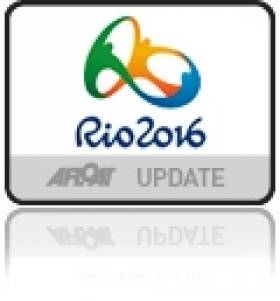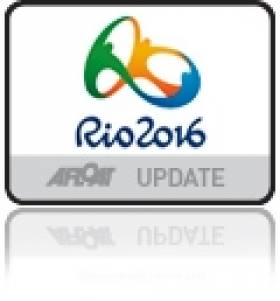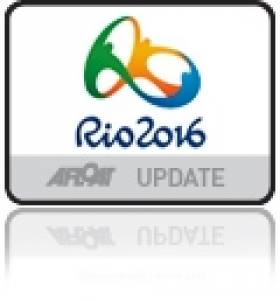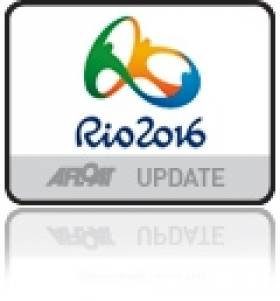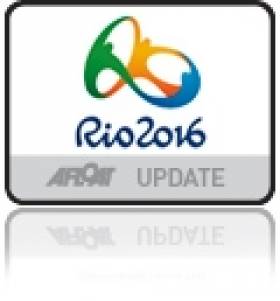Displaying items by tag: 49erfx
#49erfx – After four opening races at the 2015 49er & 49erFX European Championships in Portugal Andrea Brewster and Saskia Tidey who are campaigning for next year's Rio Olympic regatta will be disappointed to be 33rd in a fleet of 39. The sun rose, sailors rigged, and the championship started on time under blue skies, light winds, and fair swell. Two fleet of the worlds best skiff sailors took to the water to compete in the 49erFX, with the men's 49er scheduled to start this morning.
This championship is the second most important event of the year behind the World Championship, and decides much in the way of funding, team selection, and bragging rights.
The first races had lighter wind with teams double trapezing but surging in and out with the ocean swell, searching for power. As the sea breeze built so did the power and teams scored themselves some wild rides. It was an interesting combination of shifty and side dominated racing.
Having the best of the day was the Netherlands Annemiek Bekkering and Annette Duetz.
The 49erFX schedule is Qualifying July 6-8, Gold Fleet 9-11 and medal race also on 11th.
The 49er schedule is Qualifying July 7-9, Gold Fleet 10-12 and medal race also on 12th.
Results are here
Annalise in Top Three at ISAF World Cup, Weymouth
#isafworldcup – Annalise Murphy is in the top three of the women's Laser Radial fleet at the ISAF World Cup fleet in Weymouth after today's two opening races in an 'uncommon' 15–knot easterly breeze. The Dun Laoghaire star scored a second in the first race and a sixth this afternoon in her 36–boat fleet. 16–year–old Aoife Hopkins of Howth Yacht Club, who earned her place by virtue of her performance (40th overall in an 82–boat fleet) at last month's Delta Lloyd regatta in Holland, lies 35th.
Belfast Lough's Ryan Seaton and Matt Mc Govern are 27th from 39th in the 49er skiff dinghy after counting a 13 and a disappointing 35 this afternoon.
In the women's skiff, Royal Irish pair Andrea Brewster and Saskia Tidey are scored as 'did not compete' in the first three races of the 49erFX class. Unfortunately the Dun Laoghaire pair were unable to race as a result of Tidey's 'suspected food poisoning' or 'some sort of vomiting bug'.
Ranging from 10-15 knots, the breeze coupled with glorious sunshine, resulted in some exceptional racing on the 2012 Olympic waters.
The stakes have been described as high by the competitors competing in Great Britain and rightly so with internal Rio qualification battles on-going, ISAF Sailing World Cup honours, a share of the prize fund and Abu Dhabi Final spots up for grab.
Racing commenced at 11:00 local time and wrapped up early evening with the ten Olympic, three Paralympic and Kiteboarding events completing their race schedule.
Laser
New Zealand's Andy Maloney came out with intent in the Laser, taking the day one lead with a strong performance as he explained, "We had good breeze between 10 and 15 knots. It was pretty shifty on the course but I had good pace and played the shifts and managed to come away with a first and second which is pretty solid. It was a good day."
The Road to Rio is a hard one and as well as international threats, Maloney also has to contend with domestic rivals on his journey. With the likes of his compatriots Sam Meech, Mike Bullot and Thomas Saunders all capable of challenging for medals, Maloney feels no internal pressure, "It's good for us and the Australians to have a good squad and we're all pushing each other hard.
"It's exciting more than anything now in the Laser because it's coming down to the final part of the cycle so it's crunch time now."
Yachting New Zealand named six crews for the Olympic Test Event on 18 May – see release here - . And as stated, will consider nominations the Laser following the World Cup Weymouth and Portland. A good performance by Maloney could go a long way for selection with Bullot in 15th, Saunders 20th and Sam Meech 21st after the opening day.
Nick Thompson (GBR) was not far off of Maloney's pace, finishing behind him in both races to sit in second.
London 2012 Olympic silver medallist Pavlos Kontides (CYP) was almost as strong in Weymouth and Portland's conditions as he did so well three years prior. A seventh and a fourth puts him third overall but he's got his eye on the top, "I'm satisfied with my performance and races today but there's still a long way to go and I hope to move up. Having 40 top guys with this new ISAF World Cup, the stakes are high.
"You have to push to the end and every race counts. You can win this event without winning any races. Consistency will prove vital in the end."
The day's remaining race win went the way of Jesper Stalheim (SWE) who is fourth overall.
Laser Radial
The last time Marit Bouwmeester (NED), Evi Van Acker (BEL) and Annalise Murphy (IRL) competed against each other at Weymouth and Portland they were locked in a battle for Olympic medals.
Fast forward three years and they're fighting it out again at the ISAF Sailing World Cup.
Marit Bouwmeester (NED) was assertive on the race course, winning both races by a comfortable margin. The Dutch sailor, who won silver at London 2012, sits atop the pile with Evi Van Acker, London 2012 bronze medallist, trailing on five points following a 3-2 scoreline.
Murphy came through in second in the opening race and followed it up with a sixth in Race 2. She is third on eight points.
Great Britain's Alison Young sits fourth on 13 points.
49er and 49erFX
On the face of the 49er results it would be quick to assume that leaders Lukasz Przybytek and Pawel Kolodzinski (POL) were the stand out performers of the day. However, regattas aren't won on the first they. It takes a consistent performance across five days of racing to come out on top and the most consistent team of the day were the first placed John Pink and Stu Bithell (GBR).
The pair recorded a 8-3-9 scoreline and were the only team to record three single digit scores. "On the first day of the regatta it's always nice to start well and we're thrilled to bits with three top tens. We're fifth overall which is great and tomorrow brings another challenge because it's going to be windy and we'll be pushing on and hopefully get into that top three.
"It's a great fleet, the top boats in the world are here and no one is really missing. It's great that everyone is competing in the ISAF Sailing World Cup."
Bithell won silver in the Men's 470 at London 2012 and on his home waters he knows what the venue is all about, "You could argue that I know Weymouth fairly well," he said with a smile. "I've lived here for some years now, did the Olympic Games here and is there a home advantage," he pondered, "yes there probably is but incidentally we don't always get the wind direction we had today."
The Polish crew lead on seven points with Pink and Bithell four points off the leaders. Nathan Outteridge and Iain Jensen (AUS) and Dylan Fletcher and Alain Sign (GBR) are tied on 8 points in second and third.
Maiken Foght Schutt and Anne-Julie Schutt (DEN) lead the way in the 49erFX on three points following scores of 6-2-1. Alex Maloney and Molly Meech (NZL) follow in second place on six points.
Sarah Steyaert and Aude Compan (FRA), Tamara Echegoyen and Berta Betanzos (ESP) and Martine Grael and Kahena Kunze (BRA) are tied on seven points from third to fifth.
Men's and Women's RS:X
It's a British 1-2 in the Men's RS:X and Women's RS:X. Nick Dempsey and Tom Squires are locked on three points apiece in the men's whilst Isobel Hamilton leads Bryony Shaw by a single point in the women's.
From three races Dempsey and Squires took a race victory each with the third place Mattia Camboni (ITA) taking the other.
"We had nice racing, very close," exclaimed Dempsey. "Tom and I are quicker than the fleet. Our training's gone really well and we're starting to sail well. It's nice and quite good fun racing."
The pair train together on a daily basis which has helped them in the build-up to the regatta as Dempsey explained, "It's nice having a competitive training partner. When we train we know we're training against one of the fastest people in the world.
"You never have to compensate. If you're beating Tom then you know you're going fast. That is what we've always missed having with our training partners so it's brilliant news."
"It's nice and quite good fun racing Tom."
In the Women's RS:X, Hamilton enjoyed a solid day on the water, staying at the front of the pack notching up a 6-2-2 scoreline. "It was definitely my best first day at a World Cup so far," said the smiling Hamilton, "I would love to be able to hold on to first for the whole week.
"It was really good racing and it's really nice to be racing at home. Weymouth is a fantastic venue and it's really great to be back here."
Shaw is a point off of Hamitlon after her 4-1-4 with London 2012 Olympic silver medallist Tuuli Petaja-Siren third overall. The day's race wins went to Joanna Sterling (AUS), Shaw and Ingrid Puusta (EST).
Finn
Andrew Murdoch (NZL) opened his Weymouth and Portland account with a strong display in the Finn, notching up a 3-2 to lead the 24-boat fleet.
Murdoch, a 2012 OIympian in the Laser, used his experience to full effect at the front of the fleet. He has opened up a four point lead over Jonathan Lobert (FRA).
Giles Scott (GBR) took the opening race victory of the day and followed it up with a 12th. He is third overall. The remaining race victory went the way of Josh Junior (NZL) who is sixth overall but just three points off the third placed Scott.
Men's and Women's 470
It's like London 2012 repeated in the Women's 470 with the gold and silver medallists occupying the spots they claimed three years ago.
Gold medallists Jo Aleh and Polly Powrie (NZL) dominated the day by taking both bullets whilst silver Hannah Mills and Saskia Clark (GBR) were forced to look at the back of the Kiwi boat in both races as they settled for two seconds.
Tina Mrak and Veronika Macarol (SLO) sit in third after the opening two races following a 4-3.
In the Men's 470, Stu McNay and David Hughes (USA) have a tasty six point lead over World #1 Panagiotis Mantis and Pavlos Kagialis (GRE). A fourth and a second gives them the lead at the early stage but with their experience, they won't be getting carried away.
Victories on the day went to the Greeks and Ferdinand Gerz and Oliver Szymanski (GER) who are sixth overall.
Nacra 17
As of 19:20 local time Thomas Zajac and Tanja Frank (AUT) lead the way in the Nacra 17. However, many of the competitors sailed the wrong course in Race 1 with Race Committee protests and vice versa. A handful of protests remain open that may result in further amendments.
As it stands the Austrians top the pile on four points followed by Matias Buhler and Nathalie Brugger (SUI) and Jason Waterhouse and Lisa Darmanin (AUS).
Paralympic Events
London 2012 Paralympic gold medallist Helena Lucas (GBR) began her World Cup campaign with intent. Double bullets give her a two point lead over Antonio Squizzato (ITA) who finished directly behind the Briton in both of the days races.
Malaysia's Al Mustakim Matrin sits in third overall.
In the SKUD18, Marco Gualandris and Marta Zanetti (ITA) and Alexandra Rickham and Niki Birrell (GBR) are level on three points.
The Italian and British teams shared the top two places on the day, taking a bullet and a second apiece.
Will Street and Megan Pascoe (GBR) are third overall.
It is tight at the top in the Sonar with four crews locked on five points.
Norway's Aleksander Wang-Hansen, Marie Solberg and Per Eugen Kristiansen took the opening bullet of the day and followed it up by a fourth.
John Robertson, Hannah Stodel and Steve Thomas (GBR) took the second bullet of the day but like the Norwegians also count a fourth.
Colin Harrison, Jonathan Harris and Russell Boaden (AUS) and John Twomey, Austrin O'Carroll and Ian Costelloe (IRL) notched up a second and a third each and are also tied with the Norwegian and Irish crews.
Racing resumes at 11:00 local time on Thursday 11 July with some great race action on the cards.
Royal Irish Yacht Club Get Behind Women's 49erfx Olympic Bid
#49erfx – Saskia Tidey and Andrea Brewster's Olympic skiff campaign has been boosted by support from Club commodore James Horan of the Royal Irish Yacht Club.
The RIYC duo are currently seeking Olympic selection in the 49er FX Skiff Class for the Rio de Janeiro Olympic Games in 2016, when, for the first time, the all-female Skiff Class will be included in the Games.
The pair have been training in Australia and in Florida and competing internationally in order to acquire the appropriate ranking to represent Ireland at the Olympics.
Despite joining the ranking process later than others, they are now ranked as the 14th Nation and the 24th Boat in the world. There are many more competitions yet to take place before the selection for an Olympic place, but this place is now within their grasp.
In an open letter to members, Commodore Horan explains that the Royal Irish Yacht Club is planning to host a fundraising event to assist them in the considerable expense involved in renewing and updating their equipment and continuing their training.
Upcoming events in Palma de Mallorca, France, Italy, Holland, the UK and Portugal will lead to the World Championships in Argentina in October/November of this year and ultimately the aim is the Olympic Games in 2016.
'Apart from the fact that the Olympic Games take place only every four years, it is an even rarer event to have young Members of the Royal Irish Yacht Club attempting to compete in them. I therefore urge the membership to get solidly behind this initiative and support the efforts of these two young ladies, of whom we are immensely proud' Horan says.
ISAF Votes for Double Points Medal Race for 49er & 49erFX at Rio 2016 Olympic Sailing Competition
The final day format for the 49er and the 49erFX Olympic regatta was a hotly discussed topic at the ISAF conference in Mallorca that drew to a close today. ISAF Council voted for one double points Medal Race without boundaries and a target time of 20 minutes.
It was also decided that all supplied equipment at the Rio 2016 Olympic Sailing Competition should be distributed after a public draw, ensuring transparency.
As part of the Rio 2016 Olympic Sailing Competition Qualification System, ISAF included Continental Qualification Events in the pathway to help develop sailing around the world. Reflecting the IOC Qualification System Principles the key requirements are to ensure participation of the best athletes and ensure universality through continental representation.
ISAF Council agreed on the recommendation from the Events Committee on the regattas that will be held in 2015 and 2016.
African qualification events will be held at the 2016 Trofeo Princesa Sofia Regatta in Mallorca, Spain as well as events in Cape Town, South Africa and Algeria. The 2015 ISAF Sailing World Cup Asia and 2015 ASAF Cup in UAE will see the Asian qualification spots picked up. European spots will be available at the 2016 Trofeo Princesa Sofia Regatta with 2015 ISAF Sailing World Cup Melbourne providing the Oceanic qualifiers. The 2015 Pan-American Games will decide one quota place each in the Laser and Laser Radial for North and South America. The additional places will be up for grabs at the 2016 edition of ISAF Sailing World Cup Miami.
#irl49er – A capsize avoiding a boat in the five minute starting sequence was an unfortunate conclusion to the 2014 European championships for Andrea Brewster and Saskia Tidey in Helsinki yesterday but overall a 19th scored from 28 in the gold fleet and 16th girls and 13th in the European Trophy are results the Royal Irish pair can bank on for important Sports Council funding in 2015. (See results downloadable below in pdf format).
In the men's 49er division, Ireland's Ryan Seaton and Matt McGovern finished 13th from 28 in the gold fleet.
The defending European 49er Champions held on to their crowns in both the men's and women's fleets at the Seiko 49er & 49erFX European Championship, which reached a thrilling conclusion yesterday in Helsinki.
Ida Marie Nielsen and Marie Olsen went into today's three Grand Final races just a point behind the New Zealanders Alex Maloney and Molly Meech. The Danes looked relaxed but determined and sailed a very solid three races, waiting for the others to make mistakes. With the Theatre Style racing format, principal race officer David Campbell-James set a short course for the top ten 49erFX crews of just 750m from top to bottom, and just 450m wide, each edge of the course limited by boundary lane ropes similar to those seen at a swimming gala.
With the fleet forced into multiple tacks and gybes on the two-lap course, and the wind blowing a shifty, gusty 14 to 18 knots, crisp boathandling and fast decision-making were critical. The Kiwi team reached the top mark of the first race in good shape, in 2nd place behind Jena Mai Hansen and Katia Iversen of Denmark. However Maloney and Meech were unable to bear away, and continued further upwind. "There was a big gust as we arrived at the top mark," explained Maloney, "and we didn't feel we could turn the boat away, so we held on a few moments." It was a critical few seconds that allowed other boats to overtake, and it set the tone for the reigning World Champions who just couldn't quite make things go their way today.
Meanwhile Nielsen and Olsen recovered from a shaky moment to finish 6th in the first race, and then put the hammer down to win the final two races, securing Championship victory. The Brazilian team Martine Grael and Kahena Kunze also finished strongly with two 3rd places, putting them on equal points with the Kiwis. The Brazilians' better finish in the final race gave them the silver medal on countback, relegating the World Champions to the bronze medal position. The top three – Denmark, Brazil, New Zealand – are an exact replica of the medal winners at the 2013 European Championships a year earlier in Aarhus, Denmark.
Asked which European title they had most enjoyed winning, Olsen commented: "It was great winning on home waters last year in Denmark, but the battle was much closer this year, so we're very happy to have defended our title."
Attention then turned to the 49er men, with the reigning World Champions from New Zealand going into the final three races with an 11-point margin over the 2012 Olympic Champions from Australia. Pete Burling and Blair Tuke were fast out of the blocks, taking the lead in the first race. Meanwhile, behind them carnage ensued for Nathan Outteridge and Iain 'Goobs' Jensen. "We had a port-starboard incident with John Pink up the first leg," said Outteridge. "Then down the run Goobs's trapeze wire snapped, we reckon from Pinky's boom nicking the rope earlier." With Jensen in the drink, Outteridge tried to drop the gennaker singlehanded. "My plan was to drop the kite, sail round the leeward gate and pick Goobs up on the way back up the next leg. But I capsized, and all I managed to do was give Goobs 200 metres more of swimming to do." By the time Jensen was back on board with the boat upright, the fleet was long gone. Last place for the Aussies.
The capsize put the Australians into a tight battle for the silver or bronze with the Germans, Erik Heil and Thomas Ploessel, and Dylan Fletcher and Alain Sign from Great Britain. Then it went bad for Outteridge again, this time at the windward mark of race 2 as he went round in traffic and with wind shadow from another boat, found himself waterskiing off the back of the boat as Jensen tried to hoist the gennaker. The Australian boat narrowly avoided a capsize but once again was at the back of the fleet. Incredibly the Aussies salvaged a 7th from the race, but a 3rd place for the Kiwis proved sufficient to give them overall victory with a race in hand.
With the gold medal already decided, spectators turned their attention to the three-way fight between Great Britain, Germany and Australia. Once again the Kiwis led the way, winning the race by a big margin. Outteridge sailed a solid race for 2nd place, but the Germans had been too consistent with 3,2,3 – taking the silver medal by just over 2 points from the British, who sneaked the bronze by just 0.6 points from the Australians. The Olympic Champions would leave Helsinki empty-handed. "Oh well, you can't have things go your way all time," said Jensen. "I guess we'll have to do some practice." And practice is what they will need if they're to reclaim the mantle of invincibility from the New Zealanders who have gone unbeaten since taking the Olympic silver medal two years ago at London 2012.
"We're stoked to win," said Tuke. "We loved the racing here, especially the theatre-style racing we did today. It was just awesome sailing." Next stop for the Kiwis and many of the other top teams in the 49er and 49erFX is Rio de Janeiro for the Olympic test regatta next month.
#49erfx – A promising mid–fleet performance for Ireland's newest Olympic sailing duo came to a dramatic halt on Lake Garda, Italy yesterday when a race course crash put paid to a stronger performance for 49erFX pair, Andrea Brewster and Saskia Tidey in the ladies skiff class.
Luckily a suspected broken arm for crew Saskia Tidey has turned out to be only heavy bruising following a crash in yesterday's high winds at the climax of the Italian Olympic regatta.
The team tweet as below:
Forstay to the face and banged up arm ... Hectic day at the office #skiffracing pic.twitter.com/ZHt5rd4JAm
— Saskia Tidey (@SaskiaTidey) May 10, 2014
#annalisemurphy – Annalise Murphy has won Eurosaf Gold again on Lake Garda this afternoon in a commanding display of heavy air sailing with five race wins in the past week. Twice in a fortnight the Irish Olympic Sailing team is returning home from an international regatta with a medal, a sign of good progress after some early 'rusty' performances this season.
Two weeks ago in France it was the 49er duo Ryan Seaton and Matt McGovern but this afternoon it's was reigning European Laser Radial Champion Annalise Murphy's chance to shine.
Some on Lake Garda had come to an early decision about the winner in the Laser Radial fleet with Annalise winning twice on Saturday to give her a 16–point lead on Silvia Zennaro ITA going into today's final. In the end the National Yacht Club sailor easily defended her 2013 Italian Eurosaf crown, taking out Zennaro in a pre–start manoeuvre at the medal race. Later she would tweet: 'Medal race went to plan!'
Murphy shrugged off a first race 33rd result on Tuesday to overhaul her 39–boat fleet with a sizeable overall lead.The Dubliner won five of the eight races, admittedly in a fleet devoid of some of her fiercest Olympic rivals, but nevertheless a convincing performance that concluded with a sixth in today's final.
Delighted to win here at Lake Garda! Medal race went to plan! All packed up now just before the lightning storm! pic.twitter.com/7WCtPhtLUT
— Annalise Murphy (@Annalise_Murphy) May 11, 2014Unfortunately, the Irish 49er (Afloat's Sailors of the month for April) duo were unable to make amends for a boat handling error yesterday as the 49er medal race was cancelled today leaving them in fourth overall at Italian Olympic week.
Full results for all classes here
The next round of action for the Irish Olympic sailing team (and another medal?) is in a fortnight's time at Holland's Delta Lloyd regatta.



























